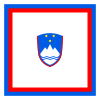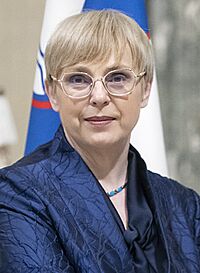President of Slovenia facts for kids
Quick facts for kids President of the Republic of Slovenia |
|
|---|---|

Flag of the President
|
|
| Office of the President of the Republic | |
| Style | Madam President (Slovene: Gospa predsednica) (informal) Her Excellency (Slovene: Njena ekscelenca) (diplomatic) |
| Member of | National Security Council (upon invitation of the Prime Minister) |
| Reports to | National Assembly |
| Residence | None |
| Seat |
|
| Appointer | Popular vote |
| Term length | Five years,
renewable once
|
| Constituting instrument | Constitution of Slovenia (1991) |
| Inaugural holder | Milan Kučan |
| Formation | 10 May 1990 (de facto) 23 December 1991 (de jure) |
| Deputy | Speaker of the National Assembly (as acting president) |
| Salary | €5,419 monthly |
| Website | Official website: http://www.up-rs.si/ |
The President of Slovenia is the head of state for the country of Slovenia. This important job was created on December 23, 1991. This happened after Slovenia became independent from the Socialist Federal Republic of Yugoslavia. Since then, five people have served as president. The current president is Nataša Pirc Musar, who is the first woman to hold this position. The president's main office is in the Presidential Palace in Ljubljana.
Contents
How is the President Elected?
The president is chosen by the people of Slovenia in an election. Anyone who is 18 years or older and a Slovenian citizen can run for president. They serve for five years. A president can only be elected for two terms.
The president does not have special legal protection from being charged with a crime. They can be removed from office if they do something wrong.
What Does the President Do?
The President of Slovenia is the highest representative of the country. This role is separate from the government, parliament, or courts. The president represents Slovenia to other countries. They also help keep the country united at home. The president is the leader of Slovenia's armed forces.
The president makes sure that laws are followed. They also help keep Slovenia's democratic system working smoothly. When a president takes office, they promise to uphold the country's laws. They also promise to do their best for Slovenia.
Slovenia has a system where the parliament and prime minister have most of the power. The president's role is mostly ceremonial. This means they perform important duties but have limited political power. However, the government must keep the president informed about important matters. The president can also make some decisions on their own.
Helping with Laws
The president has a few roles related to making laws:
- Calling Elections: The president can call for national elections for the National Assembly. They also call the first meeting of the new National Assembly after an election.
- Special Meetings: The president can ask the National Assembly to hold special meetings if needed.
- Dissolving Parliament: The president can end the National Assembly's term early and call for new elections. This only happens if the National Assembly cannot choose a prime minister. It can also happen if the government loses a vote of no confidence and a new prime minister isn't chosen quickly.
- Sharing Opinions: The president can share their thoughts on important national issues with the National Assembly.
- Signing Laws: The president officially signs laws passed by the National Assembly. This must happen within eight days. The president cannot refuse to sign a law that has been properly passed.
Working with the Government
The president also has duties related to the government:
- Choosing the Prime Minister: The president suggests a candidate for prime minister to the National Assembly. They talk to leaders of political parties first. The National Assembly then votes on the candidate. If the first choice isn't approved, the president can suggest others.
- Appointing Officials: The president suggests people for important jobs. These include the head of the Central Bank of Slovenia, members of the Court of Audit, and the Human Rights Ombudsman. The National Assembly must approve these choices.
- Foreign Relations: The president represents Slovenia in international matters. They appoint Slovenian ambassadors to other countries. They also welcome foreign diplomats to Slovenia. The president also makes state visits to other countries. They must talk to the foreign minister about these matters. However, the president does not have to follow the foreign minister's advice.
- Treaties: The president can confirm international agreements (treaties). Before doing so, they can ask the Constitutional Court if the treaty follows Slovenia's Constitution. If the court says it doesn't, the treaty is stopped.
Leading the Military
The president is the supreme leader of the Slovenian Armed Forces. This means they are the commander-in-chief.
- Emergency Powers: The president can declare a state of emergency or a state of war if Slovenia is attacked. This can only happen if the National Assembly cannot meet.
- Military Orders: The president approves plans for the armed forces. They also receive updates on the military's readiness.
- Mobilization: The president can order the military to prepare for action, but usually only if the government suggests it.
- Using the Military: The president decides how and where the armed forces are used.
Other Important Roles
- Issuing Decrees: In times of national crisis, the president can issue special orders called decrees. These orders have the power of law. They can even temporarily limit some human rights. This only happens if the National Assembly cannot meet and there is a state of war or emergency.
- Granting Pardons: The president can forgive or reduce sentences for people convicted of crimes. This is called the power of clemency.
- Nominating Judges: The president suggests judges for the Constitutional Court and members of the Judicial Council. They also nominate Slovenian judges for international courts. The National Assembly must approve these choices.
- Giving Awards: The president gives out state awards and honors to people who have done great things for Slovenia. They can also take these honors away. Citizens can suggest people for awards. A Slovenian citizen also needs the president's permission to accept an award from another country.
Who Were the Presidents of Slovenia?
Here is a list of people who have served as president or in similar top roles in Slovenia.
Leaders Before Independence (Socialist Republic of Slovenia)
Parties; KPS / ZKS OF SDP
| No. | Name (Born–Died) |
Portrait | Time in Office | Political party | |
|---|---|---|---|---|---|
| Presidents of the People's Assembly 1953–1974 |
|||||
| 1 | Ferdo Kozak (1894–1957) |
 |
30 January 1953 | 15 December 1953 | OF |
| 2 | Miha Marinko (1900–1983) |
 |
15 December 1953 | 9 June 1962 | ZKS |
| 3 | Vida Tomšič (1913–1998) |
 |
9 June 1962 | 25 June 1963 | ZKS |
| 5 | Ivan Maček (1908–1993) |
 |
25 June 1963 | 9 May 1967 | ZKS |
| 6 | Sergej Kraigher (1914–2001) |
 |
9 May 1967 | 1973 | ZKS |
| 7 | Tone Kropušek (1928–2017) |
 |
1973 | 1974 | ZKS |
| 8 | Marijan Brecelj (1910–1989) |
 |
1974 | 9 May 1974 | ZKS |
| Presidents of the Presidency 1974–1991 |
|||||
| 9 | Sergej Kraigher (1914–2001) |
 |
9 May 1974 | 23 May 1979 | ZKS |
| 10 | Viktor Avbelj (1914–1993) |
 |
23 May 1979 | 7 May 1984 | ZKS |
| 11 | France Popit (1921–2013) |
 |
7 May 1984 | 6 May 1988 | ZKS |
| 12 | Janez Stanovnik (1922–2020) |
 |
6 May 1988 | 10 May 1990 | ZKS |
| (12) | SDP | ||||
| 13 | Milan Kučan (born 1941) |
 |
10 May 1990 | 23 December 1991 | SDP |
Presidents of the Republic of Slovenia (Since Independence)
Parties; ZLSD / SD LDS Independent
| No. | Portrait | Name (Born–Died) |
Time in Office | Political Party | Elected | ||
|---|---|---|---|---|---|---|---|
| Started Job | Left Job | Total Time | |||||
| Presidents 1991–present |
|||||||
| 1 | Milan Kučan (born 1941) |
23 December 1991 | 22 December 2002 | 10 years, 364 days | SD Independent |
1990 1992 1997 |
|
| 2 | Janez Drnovšek (1950–2008) |
22 December 2002 | 23 December 2007 | 5 years, 1 day | LDS Independent |
2002 | |
| 3 | Danilo Türk (born 1952) |
23 December 2007 | 22 December 2012 | 4 years, 365 days | Independent | 2007 | |
| 4 | Borut Pahor (born 1963) |
22 December 2012 | 22 December 2022 | 10 years | SD Independent |
2012 2017 |
|
| 5 | Nataša Pirc Musar (born 1968) |
23 December 2022 | Incumbent | 3 years, 67 days | Independent | 2022 | |
Latest Election
The most recent election for president was the 2022 Slovenian presidential election.
See Also
 | John T. Biggers |
 | Thomas Blackshear |
 | Mark Bradford |
 | Beverly Buchanan |







